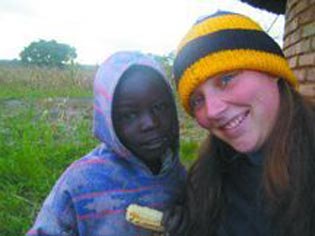 When Julia Wight first saw a girl arrive at Zimbabwe’s Howard Salvation Army Hospital last winter, the tiny child with the skinny arms and pronounced belly couldn’t even walk. Four-year-old Tatenda, who was brought to the institution by her grandmother, only carried the weight of an average two-year-old.
When Julia Wight first saw a girl arrive at Zimbabwe’s Howard Salvation Army Hospital last winter, the tiny child with the skinny arms and pronounced belly couldn’t even walk. Four-year-old Tatenda, who was brought to the institution by her grandmother, only carried the weight of an average two-year-old.
For the first three weeks of her stay, all Tatenda could do was sleep. At Howard Hospital, Wight oversaw the implementation of therapeutic feeding programs. Through the benefits of the plan, the little girl gradually gained weight.
“After six weeks the little girl got up and started walking,†Wight said, describing Tatenda’s first “unsteady†steps. “She had a smile on her face. She was a normal kid again.
“I hoped and prayed that she stayed like that when she went home.â€
On Sunday evening, the Pointe Claire resident spoke about her journey to about 65 people at the Terra Nova Youth Centre in Dorval. Members of the Brookhaven Avenue Montreal Youth for Christ facility, where she is a volunteer, were big supporters of her endeavour. She even managed to raise money for the feeding program during her talk.
Last January, the freshly graduated dietician set out on an overseas mission to change lives, including her own.
During her five-month stint to help feed malnourished children in the Mazowe district of Zimbabwe, Julia Wight did her best to do just that.
The 23-year-old McGill University graduate undertook her crusade at the Howard Salvation Army Hospital, working for fellow Canadian, Dr. Paul Thistle. She applied the feeding programs for children under the age of five.
In the region, one in 10 individuals lives with HIV, according to the Howard Hospital’s website. Children younger than 18 months are not tested for the disease because it’s too expensive. Kids are often infected with HIV, so Wight’s skills were tested.
“They (children with HIV) have a reduced appetite and the amount of energy it takes to fight off the disease is a factor as well,†Wight told The Chronicle during an interview at Terra Nova on Sunday afternoon. “You go over there and you do everything you can to make a difference, but I had to accept the fact that there’s more death over there than here.
“My goals were to see if I could handle that.â€
It was no mistake that Wight sought experience in an environment where AIDS has significant presence. She aims to return to Africa one day, as a dietician, physician or educator.
Howard Hospital serves a territory with a population of 250,000 people. The 144-bed institution, which is 80 kilometres north of the country’s capital of Harare, sees about 500 patients a day, Wight said. According to its website, 75 per cent of patients at the hospital live with HIV, AIDS and related conditions.
Stemming the spread of HIV is vital in Zimbabwe - as in many parts of Sub-Saharan Africa. During her mission, Wight joined a team that went into schools to teach secondary school students about prevention.
Every person Wight met was close to someone who died from AIDS, she said. “There’s never more than one degree of separation,†she said of the reach of the disease.
This fall Wight started her master’s degree in dietetics at McGill’s Macdonald Campus. She plans to return to Mazowe with her parents to visit friends this Christmas.
“It’s such a friendly culture,†said the tall, outgoing and affable Wight. “I got proposed to like four times. I said no, but I don’t think I broke any hearts over there.â€
by Andy Blatchford
The West Island Chronicle
Above Julia is pictured with her new friend, Joseph, whom she met in Zimbabwe
Julia attended the Salvation Army Territorial School of music and gospel arts. Her commitment to missions stemmed from her attendance there.